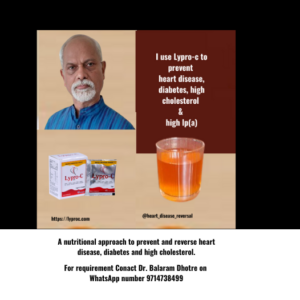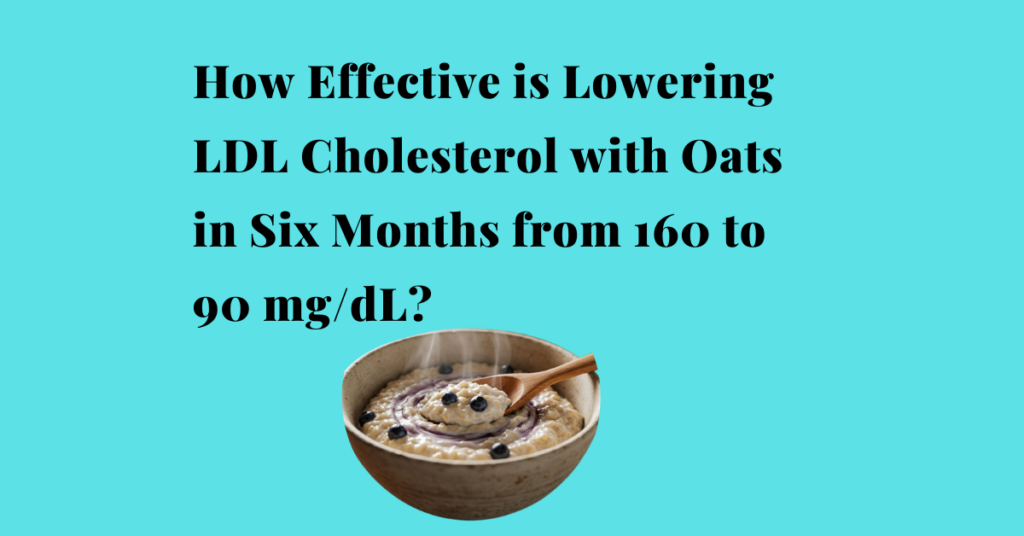Introduction
Can oats help lowering LDL cholesterol from 160 to 90 mg/dL in 6 months? Explore the realistic impact of oats, the role of beta-glucan, and the importance of a comprehensive heart-healthy approach
The quest for natural ways to manage cholesterol is a common one, and oats frequently emerge as a heart-healthy hero. Packed with soluble fiber, particularly beta-glucan, oats are often touted for their cholesterol-lowering potential. But if your LDL (“bad”) cholesterol is sitting at 160 mg/dL, can you realistically expect to bring it down to a target of 90 mg/dL within just six months by relying solely on oats? Let’s delve into the truth and explore the potential impact of this popular grain.
Table of Contents
The Reality of LDL Reduction with Oats
The cholesterol-lowering power of oats lies in their beta-glucan content. This soluble fiber works in the digestive system by binding to bile acids, which are made from cholesterol. This binding action prevents a significant portion of these bile acids from being reabsorbed, prompting the liver to use more cholesterol from the bloodstream to create new bile acids. This process, over time, can lead to a reduction in LDL cholesterol levels.
However, scientific studies generally indicate that consistent daily consumption of the recommended amount of oat beta-glucan (around 3-4 grams) typically results in a modest reduction in LDL cholesterol, often in the range of 5-15%.
Let’s put that into perspective for someone with an initial LDL of 160 mg/dL:
- A 5% reduction would be 160 * 0.05 = 8 mg/dL (bringing LDL to 152 mg/dL).
- A 15% reduction would be 160 * 0.15 = 24 mg/dL (bringing LDL to 136 mg/dL).
As you can see, even at the higher end of the typical reduction range, oats alone are unlikely to bridge the 70 mg/dL gap needed to reach an LDL level of 90 mg/dL within six months.
The Target Reduction and Timeframe
Lowering LDL from 160 mg/dL to 90 mg/dL requires a substantial reduction of approximately 44%. Achieving this level of decrease in just six months through dietary intervention with oats as the sole strategy is highly improbable for most individuals. While oats offer valuable support for heart health, their impact on lowering significantly elevated LDL levels within a short timeframe is generally limited.
Factors Influencing Cholesterol Lowering
It’s important to remember that individual responses to dietary changes can vary. The effectiveness of oats in lowering cholesterol can be influenced by factors such as:
- Dosage and Type of Oats: Oat bran, with its higher beta-glucan content, might have a slightly greater impact than rolled oats. Consuming enough daily is key.
- Consistency: Regular, daily intake is essential to see any benefits.
- Overall Diet: A diet still high in saturated and trans fats can negate the positive effects of oats.
- Individual Metabolism: People’s bodies process cholesterol differently.
- Other Lifestyle Factors: Exercise, weight management, and smoking cessation play crucial roles in cholesterol management.
The Importance of a Comprehensive Approach
Managing high LDL cholesterol effectively often requires a multi-pronged approach that goes beyond a single food. A comprehensive heart-healthy lifestyle includes:
- A balanced diet rich in fruits, vegetables, whole grains (including oats), and lean protein, while being low in saturated and trans fats.
- Regular physical activity.
- Maintaining a healthy weight.
- Avoiding smoking.
Relying solely on oats to achieve a significant LDL reduction in a short timeframe for elevated levels could delay necessary medical intervention and potentially increase your risk of cardiovascular disease.
Conclusion
While incorporating oats into your daily diet is undoubtedly a heart-healthy choice and can contribute to lowering LDL cholesterol, expecting it to single-handedly bring an LDL level of 160 mg/dL down to 90 mg/dL within six months is unrealistic for the majority of individuals. A comprehensive approach that includes a heart-healthy lifestyle and, often, medical management under the guidance of a doctor is the most effective way to achieve significant and timely cholesterol reduction.
keywords
oats, cholesterol, lower LDL, beta glucan, heart health, diet, nutrition, high cholesterol, natural cholesterol lowering, healthy lifestyle, cardiovascular disease, medical advice
=======================================================================
A supplement that can lower LDL cholesterol in a short period from 160 to 90 mg/dl.
Supplements like Lypro-C contain Vitamin C, lysine, and proline, which correct the arterial damage. This leads in effective cholesterol lowering.


